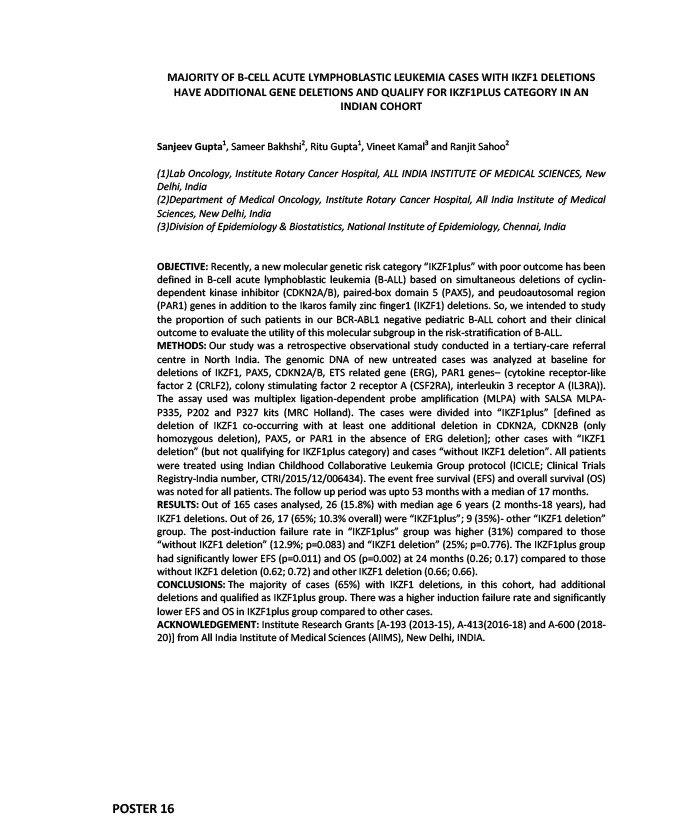
MAJORITY OF B-CELL ACUTE LYMPHOBLASTIC LEUKEMIA CASES WITH IKZF1 DELETIONS
HAVE ADDITIONAL GENE DELETIONS AND QUALIFY FOR IKZF1PLUS CATEGORY IN AN
POSTER 16
INDIAN COHORT
Sanjeev Gupta1, Sameer Bakhshi2, Ritu Gupta1, Vineet Kamal3 and Ranjit Sahoo2
(1)Lab Oncology, Institute Rotary Cancer Hospital, ALL INDIA INSTITUTE OF MEDICAL SCIENCES, New
Delhi, India
(2)Department of Medical Oncology, Institute Rotary Cancer Hospital, All India Institute of Medical
Sciences, New Delhi, India
(3)Division of Epidemiology & Biostatistics, National Institute of Epidemiology, Chennai, India
OBJECTIVE: Recently, a new molecular genetic risk category “IKZF1plus” with poor outcome has been
defined in B-cell acute lymphoblastic leukemia (B-ALL) based on simultaneous deletions of cyclin-dependent
kinase inhibitor (CDKN2A/B), paired-box domain 5 (PAX5), and peudoautosomal region
(PAR1) genes in addition to the Ikaros family zinc finger1 (IKZF1) deletions. So, we intended to study
the proportion of such patients in our BCR-ABL1 negative pediatric B-ALL cohort and their clinical
outcome to evaluate the utility of this molecular subgroup in the risk-stratification of B-ALL.
METHODS: Our study was a retrospective observational study conducted in a tertiary-care referral
centre in North India. The genomic DNA of new untreated cases was analyzed at baseline for
deletions of IKZF1, PAX5, CDKN2A/B, ETS related gene (ERG), PAR1 genes– (cytokine receptor-like
factor 2 (CRLF2), colony stimulating factor 2 receptor A (CSF2RA), interleukin 3 receptor A (IL3RA)).
The assay used was multiplex ligation-dependent probe amplification (MLPA) with SALSA MLPA-P335,
P202 and P327 kits (MRC Holland). The cases were divided into “IKZF1plus” defined as
deletion of IKZF1 co-occurring with at least one additional deletion in CDKN2A, CDKN2B (only
homozygous deletion), PAX5, or PAR1 in the absence of ERG deletion; other cases with “IKZF1
deletion” (but not qualifying for IKZF1plus category) and cases “without IKZF1 deletion”. All patients
were treated using Indian Childhood Collaborative Leukemia Group protocol (ICICLE; Clinical Trials
Registry-India number, CTRI/2015/12/006434). The event free survival (EFS) and overall survival (OS)
was noted for all patients. The follow up period was upto 53 months with a median of 17 months.
RESULTS: Out of 165 cases analysed, 26 (15.8%) with median age 6 years (2 months-18 years), had
IKZF1 deletions. Out of 26, 17 (65%; 10.3% overall) were “IKZF1plus”; 9 (35%)- other “IKZF1 deletion”
group. The post-induction failure rate in “IKZF1plus” group was higher (31%) compared to those
“without IKZF1 deletion” (12.9%; p=0.083) and “IKZF1 deletion” (25%; p=0.776). The IKZF1plus group
had significantly lower EFS (p=0.011) and OS (p=0.002) at 24 months (0.26; 0.17) compared to those
without IKZF1 deletion (0.62; 0.72) and other IKZF1 deletion (0.66; 0.66).
CONCLUSIONS: The majority of cases (65%) with IKZF1 deletions, in this cohort, had additional
deletions and qualified as IKZF1plus group. There was a higher induction failure rate and significantly
lower EFS and OS in IKZF1plus group compared to other cases.
ACKNOWLEDGEMENT: Institute Research Grants A-193 (2013-15), A-413(2016-18) and A-600 (2018-
20) from All India Institute of Medical Sciences (AIIMS), New Delhi, INDIA.